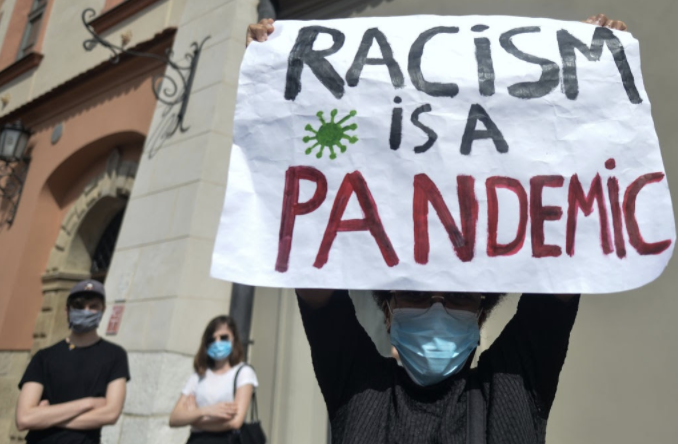By Sophie Chiang ‘23
by sophie chiang ‘23
2020 will go down as one of the most monumental years of the 21st century. In one year, people had to deal with a global pandemic, lockdowns around the world, one of the most nerve-wracking presidential elections in US history, widespread racism, and a momentous Black Lives Matter movement. Perhaps the most prominent problem 2020 highlighted is the fact that racism still exists ubiquitously around the world. Amidst all the disheartening headlines, it may seem that our future may seem bleak at the moment. But it is so important to acknowledge that there are ways we can move on from here.
2020 isn’t the year that the coronavirus came into existence, but it is the year that it became a global pandemic. A new normal had to be adopted – social distancing, hygiene, social gatherings, and masks. Perhaps a more drastic change the COVID-19 pandemic inflicted is the inequality gap between different groups of people. Because COVID-19 started in the Chinese city of Wuhan, many frustrated people have been blaming the Chinese, and even Asians as a whole, for initiating this pandemic. Since March 2020 alone, negative views of China have increased by 7 points (Pew Research). This resentment has manifested in more violent actions. An Asian woman had acid thrown on her, Asian elderly have been jumped, assaulted, and even killed, Asian-owned businesses have been robbed and ravaged, and much more. According to NYPD data, anti-Asian hate crimes have jumped by 1900% percent.
It is evidently clear that Asians were not the only race to have faced hatred and xenophobia in 2020. The United States has seen nationwide protests over the death of George Floyd, Breonna Taylor, Jacob Blake, Ahmaud Arbery, Jonathan Price, Elijah McClain, and far too many other POC who were murdered by the nation’s police. The country’s inherent systemic racism was exposed– thousands of protests fueled by anger over police brutality only elucidated that. The Black Lives Matter movement, triggered by the death of George Floyd, gained popularity online and offline as people protested against police brutality and systemic racism. These protests became a global initiative, extending to more than 60 countries. Timelines became flooded with infographics, hashtags, solidarity profile pictures, and blacked-out posts for #BlackoutTuesday.
It is true that as a society, we are slowly but surely moving forward in our march for equality. But judging from the current social and political climate, it seems like racism will still be prominent in 2021. Many governments continue to punish marginalized communities and minorities for no reason. In many countries like Myanmar and Thailand, civil unrest is taking place as citizens are becoming increasingly dissatisfied with the government. However, we have already seen changes rippling through our societies, a sign of lessons learned. Thankfully, the United States has learned enough over the past 4 years to not elect Trump for a second term. Twitter and other social media accounts learned enough to permanently ban him from their platforms. The Supreme Court ruled that LGBTQ employees are protected by civil rights employment laws. Kamala Harris was the first woman and woman of color to be elected as vice president. Amidst the chaos and dark skies, the sun has taken its occasional peek out into the sky.
And above all, the biggest lesson we must learn as we move on from 2020 is to become anti-racist. Not just simply not being racist, anti-racism means standing up to discriminatory remarks and actively uplifting BIPOC. Anti-racism occurs through small everyday thoughts and choices. We must learn to identify the subconscious biases we all have and distance ourselves from them. Only when we do this will we truly be free of our ignorance and, in turn, subconscious racism. Change starts with you changing your own thoughts, which will then manifest into genuine and concrete anti-racist actions. There are so many lessons to be taken away from this last chaos of a year, but those lessons are what are going to be so valuable for 2021 and beyond.


